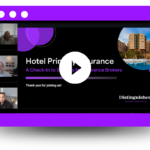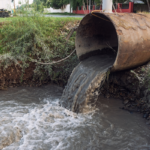Get Ready for Hurricane Season
As the hurricane season – June 1 through November 30 – unfolds, safety preparations should already be underway by homeowners and coastal business owners, including hotels and restaurants. Forecasters at the National Oceanic and Atmospheric Administration (NOAA) say the Atlantic could see another above-normal hurricane season this year, predicting a 70% likelihood of 11 to 17 named storms (winds of 39 mph or higher), of which 5 to 9 could become hurricanes (winds of 74 mph or higher), including 2 to 4 major hurricanes (Category 3, 4 or 5; winds of 111 mph or higher). The Weather Company also predicts an active season, with an expectation of a total of 14 named storms – seven hurricanes and three major hurricanes.Preparing early in the season is key in helping to mitigate risk and minimizing damage.
Get Ready for Hurrican Season with these tips:
- Ensure your building can weather a severe storm – have the building inspected and perform any maintenance required to get it storm-ready.
- Assign an employee to monitor weather reports and to alert staff of the potential of severe weather.
- Make sure employee contact information is up to date.
- Have the company’s business continuity plan/disaster plan reviewed and update it as needed, including building on critical lessons learned from past experiences (review the aftermath of Super Storm Sandy, Hurricane Katrina, for example).
- Provide all employees with a copy of the business’s disaster plan and review key elements of the plan with them. Go over emergency shutdown and start-up procedures, such as electrical systems, with appropriate personnel, including alternates. Also review post-event communication procedures with employees.
- If the business uses generators as a backup, be sure that each generator fuel tank is full and that someone knows how to acquire more fuel in the event of an outage. Test the generator(s).
- Re-inspect and replenish emergency supplies inventory.
- Test all life safety equipment.
- Conduct training/simulation exercises with the staff for both the business continuity and disaster preparedness/response plans.
Coastal homeowners as well as those living inland should be prepared for the hurricane season as well. This includes among other things: installing hurricane metal straps to help keep the roof fastened to the walls in high winds; installing and maintaining storm shutters; installing generators for emergencies (remember Super Storm Sandy and how many people were without power throughout the Tri-State area); inspecting sump pumps and drains to ensure proper operation; anchoring or removing potential windborne objects (such as barbecues, playhouses, yard furniture, etc.); reinforcing garage door; and removing trees that could fall on the house. Be sure to have a disaster kit and review the disaster plan with family members.
Insurance Is Critical
Business owners should review their insurance program including the need for separate flood coverage; business interruption insurance to help pay for ongoing expenses when a hurricane keeps the firm from operating; and service interruption insurance, which provides coverage for losses that the business incurs from interruption of utility services that result from physical damage to the property that supplies the utility; among other coverages depending on the operation and its exposures. Property limits and sub-limits along with deductibles need to be reviewed so that business owners understand the extent and amount of coverage available in their insurance programs.
Homeowners should carry flood insurance and must understand that without this coverage damage as a result of flooding in the wake of storm will not be covered. Coverage is available through the National Flood Insurance Program. Flood policies have a 30-day waiting period before coverage becomes effective, with coverage limits under the federal flood program at $250,000 on a dwelling and $100,000 on contents. For high-value homes, excess flood insurance is available and should be purchased. In addition, depending on the state, a separate windstorm policy can be purchased, which may be necessary for coastal properties as some homeowners policies may exclude damage by wind, including hurricanes and tornadoes. Homeowners insurance policies include temporary living expenses in the event relocation is necessary due to damage caused by a severe storm, fire or other insured disaster. These expenses can include reasonable hotel bills, meal tabs and other expenses while the home is being rebuilt. Be sure to review the policy to see how much coverage there is and how long it would be in effect.
We’ve all seen the devastation a hurricane can cause to property owners. Take heed and be ready for a stormy season.




